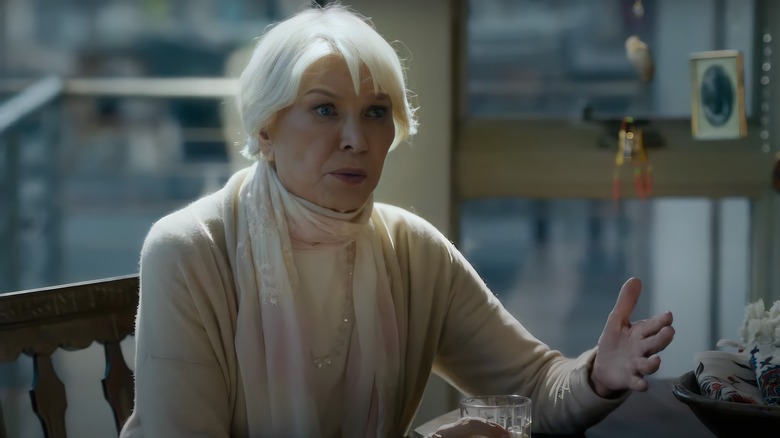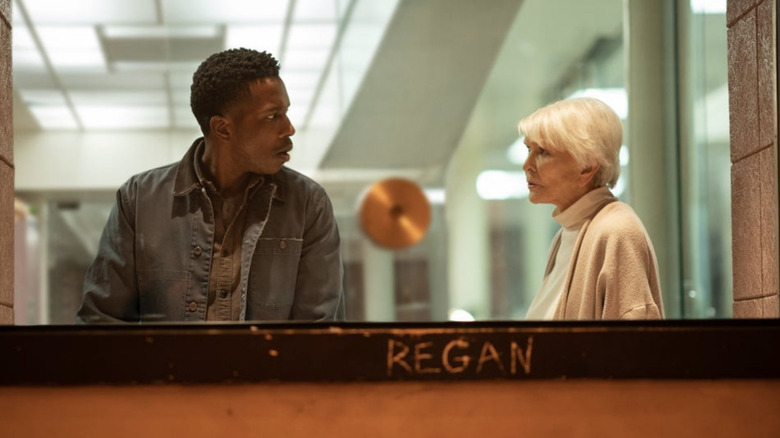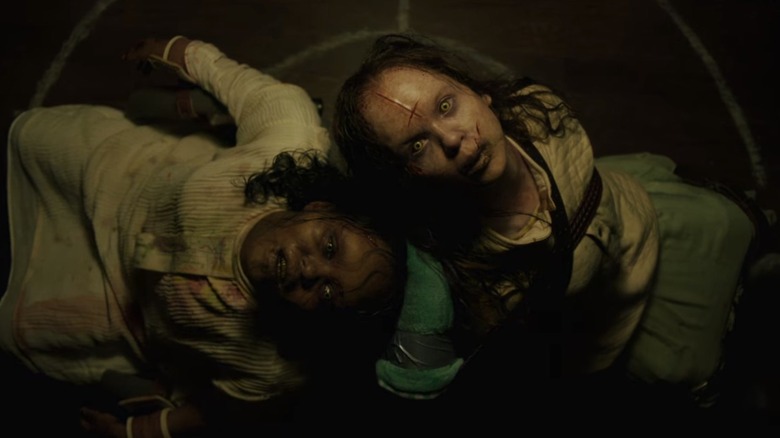The Exorcist: Believer Review: A Sour Sequel With Several Sins
- Builds up an impressive sense of dread without relying on jump scares
- Ultimately becomes a pale retread of "The Exorcist" without holding a candle to it
The biggest problem with "The Exorcist: Believer" is the first two words in the title. It may be impossible to divorce this 50-years-later sequel from its predecessor, one of the defining masterpieces of horror, but its strengths as a demonic possession tale would be a lot easier to acknowledge if it didn't have the baggage of, well, not being "The Exorcist." But after a decade of "Conjuring" movies that overlook any deeper themes of faith to focus entirely on empty-calorie jump scares, an inferior "Exorcist" sequel still feels very close to a breath of fresh air. This slow-burning, character-driven tale cares more about getting under your skin than it does simply making you jump out of it.
And yet, it's hard to overlook the fact we've seen this handled much better before, even if this is far from the disaster that reports from early test screenings warned was upon us. If anything, director David Gordon Green — returning to reboot another beloved franchise after his divisive "Halloween" trilogy – plays it too safe. "Believer" becomes a sanitized greatest-hits package in the final act, with several moments that are watered-down equivalents of the original's more outrageous sequences (those hoping for pea soup vomit and the misuse of a crucifix will be sorely disappointed). This is a movie that's strongest when focused solely on its new demonic case study, growing weaker whenever it tries to draw closer ties to a film much more impactful than it could ever be.
Not the disaster many expected ...
An opening prologue set in Haiti introduces us to photographer Victor Fielding (Leslie Odom Jr.), who loses his wife during an earthquake. Flash forward 13 years later, he's still a single father to Angela (Lidya Jewett) living a boring family life — until a crisis unexpectedly arises one day after she unexpectedly goes missing alongside her friend Katherine (Olivia O'Neill). Three days later, they're both found 30 miles from their hometown with no recollection of what happened. Both return home safe, and the authorities overlook the bizarre detail that the girls think only a few hours had passed. From here, you know the drill: They both start acting up, and it becomes clear that they have both been possessed by an evil, otherworldly entity.
Billed as the first part in a trilogy, "The Exorcist: Believer" keeps things straightforward when it comes to its storytelling, only standing out from similar horror fare thanks to its craft — I imagine its refusal to reinvent the wheel and tell a more ambitious story this time around is largely because two additional films are riding on its success. The second-act stretch, when the girls return and otherworldly occurrences happen around their families, is when the film is at its strongest, refusing to follow the same jump scare rhythms as similar recent films. When a character suddenly appears in a dark room, for example, they immediately begin speaking, not leaving a beat for the audience to leap out of their seat at their unexpected arrival. David Gordon Green understands that the scares must service the story and can't just come as a prepackaged theme park ride-style diversion, and so the film's first two acts are defined more by lingering dread, slowly building up an untrustworthy headspace via small moments — be they brief images like photos on a laptop distorting, or characters behaving unusually, but not entirely irrationally.
Naturally, this all builds into indisputable evidence of possession, which is where Green begins to stumble; even with two characters under the devil's influence rather than one, the final act follows the narrative blueprint of "The Exorcist" so closely that the extended exorcism set piece it leads to feels too familiar to properly terrify. It doesn't help that Green increasingly starts weaving in imagery from the original, be it the famous subliminal messages or the impactful jump cut from a scream to a revving vehicle engine, which dulls the momentum of his story altogether. After an opening stretch that stands out from director William Friedkin's original film, it falls back under its shadow in time for the over-the-top climax.
... But it's also not The Exorcist
The film begins to lose its way the moment Chris MacNeil (Ellen Burstyn) is reintroduced, through no fault of Burstyn's own. After the events of the 1973 film, Chris wrote a best-selling book about her experiences, which effectively ended her relationship with her daughter, Regan. Decades later, she's one of the first people Victor approaches for help, and she soon comes face to face with a familiar evil once again. There's no real justification for her inclusion in the story, a glorified cameo included solely to make the connections to "The Exorcist" as direct as possible for die-hard fans. Burstyn does her best and is handed the film's most shocking moment, but weaving her in diverts from the story itself and once again reaffirms just how much "The Exorcist: Believer" will struggle to escape its predecessor's shadow within the cultural imagination.
In fact, the most distinct aspect of this sequel might be how hesitant it is to fully commit to one school of religious thought: Victor is an atheist, and he's helped in his quest to save his daughter by Christians of various denominations. It all feels like the result of a studio note asking the filmmakers to be as religiously inclusive as possible so as to not offend anyone. It's one of a few contemporary concessions in what is, at its best, delightfully old-fashioned spooky storytelling; another comes from a cringe-inducing line where Chris blames "the patriarchy" for not being allowed to witness her daughter's exorcism, the other from a priest telling the parents to contact a mental health professional, as they're no longer allowed to perform the practice. That is the film's wildest joke, which initially appears to be setting up a more unique final act, where the exorcism must be performed by amateurs, but the film walks that back fairly quickly.
This review likely reads as more critical than what a 5/10, on-the-fence take should theoretically look like, and that returns us to the dilemma that introduced this review. In a world where "The Exorcist" doesn't exist, this film's strengths could be more deeply appreciated — but this isn't that world, and this new film's flaws are only more accentuated due to how much they'll be compared to the earlier film's strengths. "The Exorcist: Believer" is by no means a bad movie, but when you could be watching the original instead, you'll need a lot more than the power of Christ to compel you to watch it.
"The Exorcist: Believer" hits theaters October 6.


